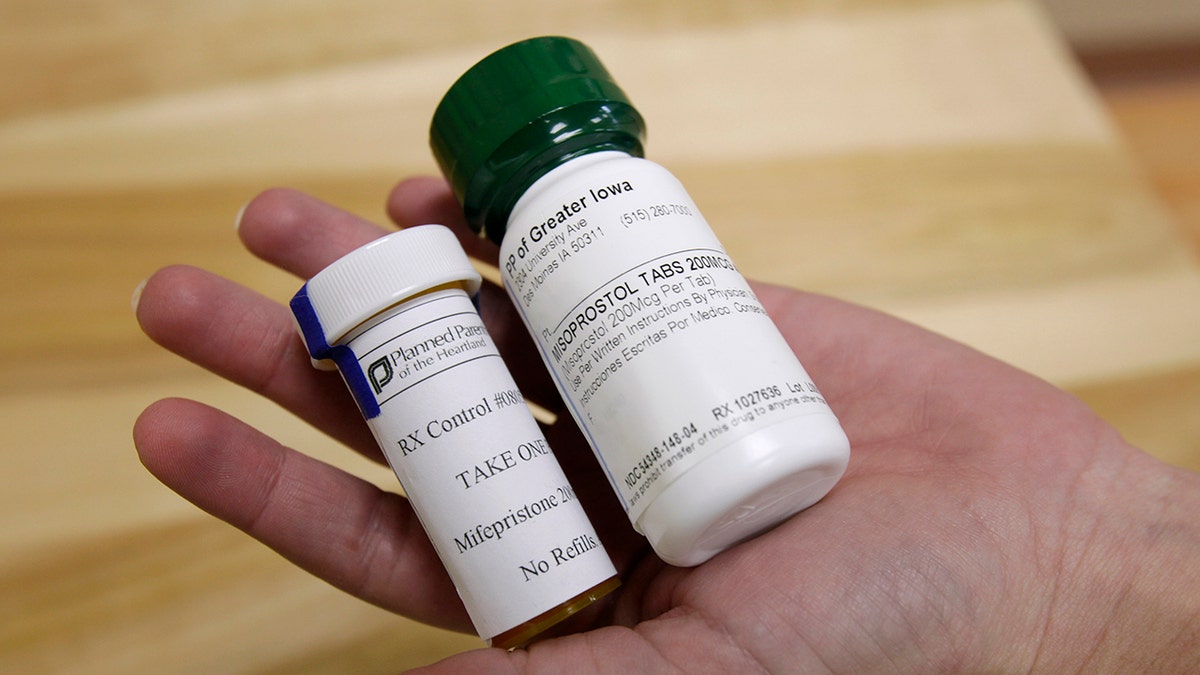HHS Secretary says ignoring federal judge’s abortion pill ruling is ‘on the table’
The HHS secretary also scorched the Texas judge's ruling on the abortion pill as un-American.
A federal appeals court in New Orleans has partially overturned a lower court’s decision blocking access to a popular abortion drug. The new decision keeps the drug, mifepristone, available for purchase to consumers with some restrictions.
The 5th U.S. Circuit Court of Appeals in New Orleans ruled 2-1 Wednesday, just before midnight, to keep mifepristone available only to be dispensed up to seven weeks, not 10, and not by mail.
The drug, which is used in combination with a second drug, misoprostol, terminates pregnancies and was approved for use by the Food and Drug Administration more than two decades ago.
A lower court judge in Texas completely blocked the FDA’s approval following a lawsuit that alleges the approval was done improperly and too hastily.

Bottles of abortion pills mifepristone, left, and misoprostol, right, at a clinic in Des Moines, Iowa, Sept. 22, 2010. (AP Photo/Charlie Neibergall)
The case may now head to the U.S. Supreme Court.
Where the three judges differed — and what ultimately caused the split vote — was concerning changes made by the FDA that relaxed the rules for prescribing and dispensing mifepristone.
These changes include extending the period of pregnancy when the drug can be used and also allowing it to be dispensed by mail, without any need to visit a doctor’s office. These rules were changed in the 16 years since the FDA’s initial approval of mifepristone in 2000.
SCHUMER SAYS JUDGE'S MIFEPRISTONE ABORTION PILL RULING ‘COULD THROW OUR COUNTRY INTO CHAOS’
Under the new appeals court order, the initial approval remains in effect, but the relaxed rules do not.
The two judges who voted to tighten the restrictions were Kurt Engelhardt and Andrew Oldham, both appointees of former President Donald Trump.
The third judge, Catharina Haynes, an appointee of former President George W. Bush, said she would have returned the initial approval and the relaxed rules — putting the district court’s ruling on hold entirely.

An ongoing lawsuit questions the Food and Drug Administration's decision to rescind the federal approval for Mifepristone, a drug that blocks a hormone called progesterone that is needed for a pregnancy to continue. (Christina House / Los Angeles Times via Getty Images)
Either side, or both, could appeal the latest decision and take the case to the Supreme Court. An appeal is expected.
GROWING NUMBER OF DEMOCRATIC STATES ARE STOCKPILING ABORTION DRUGS
The three appeals court judges noted that the Biden administration and mifepristone’s manufacturer warned of "significant public consequences" that would result if mifepristone was entirely withdrawn from the market.
A majority of the judges ruled to tight the additional rules as tt would be "difficult" to argue the changes were "so critical to the public given that the Nation operated — and mifepristone was administered to millions of women — without them for sixteen years."
The Alliance Defending Freedom brought the lawsuit challenging mifepristone's approval. They argue the FDA’s initial approval of mifepristone was flawed because the agency did not adequately review safety risks.
Mifepristone has been used by millions of women over the past 23 years, although some complications with its use occur.
CLICK HERE TO GET THE FOX NEWS APP
On Friday, U.S. District Judge for the Northern District of Texas Matthew J. Kacsmaryk directed the FDA to halt the approval of mifepristone while a lawsuit challenging its safety and approval made its way through court.

Vice President Kamala Harris speaks during a Task Force on Reproductive Health Care Access meeting with Merrick Garland, US attorney general, left, in the Roosevelt Room of the White House in Washington, DC, US, on Wednesday, April 12, 2023. (Julia Nikhinson/CNP/Bloomberg via Getty Images)
Kacsmaryk said the suspension would take effect in seven days, to allow time for an appeal.
On Wednesday, Vice President Kamala Harris joined the Task Force on Reproductive Health Care Access for a meeting at the White House, where they discussed new actions the Biden administration could take to push back against states that are imposing abortion restrictions.
The Associated Press contributed to this report.





